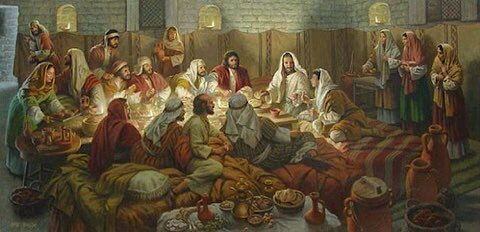Sunday Gospel Reflection

✠ A reading from the Holy Gospel according to Matthew 22:1-14.
At that time Jesus spoke again in parables to the chief priests and the elders of the people, saying, "The kingdom of heaven is like a king who was celebrating his son's wedding; he sent his servants to call the guests, but they refused to come. Again he sent other servants to tell the guests: "I have prepared the banquet, I have slaughtered calves and fattened cattle and everything is ready. Come to the wedding. But they paid no attention; one went off to his fields, another to his business, the others seized the servants and mistreated and killed them. The king flew into a rage, sent his troops, who put an end to those murderers and set fire to the city. Then he said to his servants: "The wedding is ready, but the guests did not deserve it. Go now to the crossroads of the roads and all those you find, call them to the wedding." The servants went out into the roads and gathered all they found, bad and good. The banquet hall was filled with diners. When the king came in to greet the diners, he noticed one who was not wearing a wedding garment and said to him, "Friend, how did you get in here without a wedding garment?" The other did not open his mouth. Then the king said to the servants, "Bind him hand and foot and cast him out into the darkness. There there will be weeping and gnashing of teeth." For many are called, but few are chosen." Word of the Lord.
Reflection
Today's parable continues the controversy between Jesus and the religious leaders. Jesus compares the kingdom of heaven to a king who invites to a wedding banquet with him. The banquet refers to joy, to beauty; the wedding, to the communion of life. God, through his Son Jesus, calls us into communion with himself, and in this communion, in this deep relationship of love, is our joy, eternal life! But the first guests refuse: some minimize such a beautiful invitation, others have other priorities, others resent those who invite them. Historically, it symbolizes the rejection of the "first ones" whom Jesus was addressing, that is, the people of Israel, especially their elders and leaders of the nation. But is it not also the sad reality of today? How many invited people refuse? How many times people are invited to pray, to open their hearts to Jesus, to participate in the Eucharist, to live moments of spirituality, of fraternity, but the answer is always no! They have other priorities, they have other things to do that are "more important than God". You invite them to open up to the Lord, to experience his love, his forgiveness, but they refuse or, even worse, they mock you!
What to do?
What the king does: he does not lose heart. He opens his invitation to all, without insisting too much on those. In addition to the call that Jesus addresses to sinners (and not only to the "righteous") and that the Church addresses to all peoples, in everyday experience the king's attitude suggests to us that it makes no sense to insist too much, to become heavy and petulant: sometimes the invitation falls on deaf ears because it is not yet the right time. When one refuses, one must continue to pray for that person, loving him or her, "showing the effects" of the communion lived with God, speaking only when it is necessary. And, at the same time, to bring one's own proclamation, one's own witness, to others.
The Gospel speaks of an invitation addressed to all, bad and good. Such is the proclamation of the Gospel: it is addressed to all; such are the doors of the Church, open to all. Then, those who decide for Jesus are called to live in communion with him (and must be accompanied) in their journey of conversion and maturation. If it is true that the proclamation must be addressed to all and that God's love is for all, it is also true that all those who decide for Jesus are called to walk (and be accompanied) on the path of conversion and personal maturation. Faith is called to become incarnate, to become a concrete adherence to Christ and to the Church.

